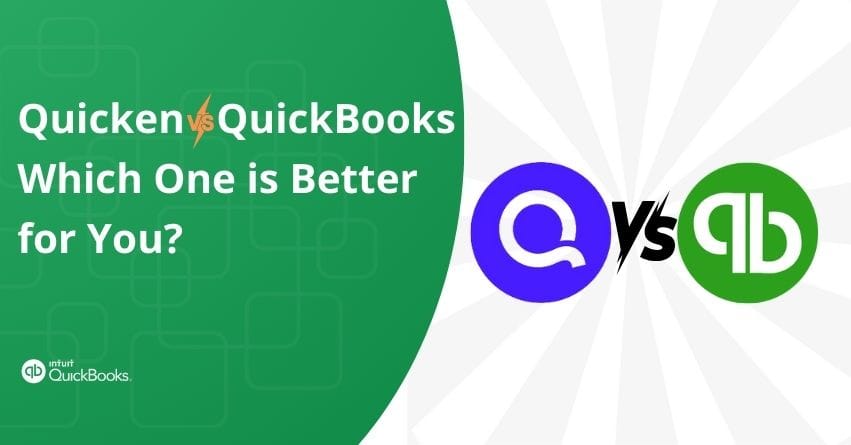When it comes to managing finances, two of the most popular software options are Quicken and QuickBooks. Both are designed to help users keep track of their money, but they serve different purposes and cater to different audiences.
Quicken is primarily designed for individuals and entrepreneurs who want to manage their personal finances effectively. It allows you to track income and expenses, create budgets, monitor investments, manage rental properties, and set up debt reduction plans. Quicken is user-friendly and less complex than QuickBooks, making it suitable for straightforward financial management. While it provides some business tools through Quicken Home and Business, it’s not as robust as QuickBooks for business purposes.
On the other hand, QuickBooks caters to small businesses, freelancers, and entrepreneurs. It offers comprehensive accounting features, including income tracking, expense management, inventory tracking, invoicing, and advanced financial reporting. QuickBooks integrates with various third-party apps, making it ideal for businesses that need robust functionality. However, it’s slightly more complex due to its business-specific features, and the cost is typically higher than Quicken.
In summary, choose Quicken if you’re focused on personal finances, and opt for QuickBooks Online if you’re running a business. Both software have their strengths, so consider your specific requirements and budget when making your decision. This article will explore the features, advantages, and disadvantages of each, helping you determine which one is better for you.
Quicken vs QuickBooks: Comparison at a Glance
| Features | Quicken | QuickBooks |
| Prices | Quicken Simplifi: $3.99 per month. Quicken Classic: $7.99 per month. Quicken Classic Business & Personal: $10.99 per month. | Simple Start: $30 per month. Essentials: $60 per month. Plus: $90 per month. Advanced: $200 per month. |
| Best For | Personal finances | Small business finances |
| Number of Users | 1 | Simple Start: 1 user; 2 accounting firms. Essentials: 3 users; 2 accounting firms. Plus: 5 users; 2 accounting firms. Advanced: 25 users; 3 accounting firms. |
| Cloud Access | Yes | Yes |
| Mobile App | Yes | Yes |
| Payroll | No | Yes |
| Integrations | Limited integrations | 750+ app integrations |
| Rental Property Features | Yes | No |
| Sharing with Accountants | Poor | Excellent |
| Scalability | Poor | Excellent |
| Time Tracking | Not available | Available with Essentials, Plus, and Advanced plans. |
| Mileage Tracking | Utilize the Vehicle Mileage Tracker to manually log trips and mileage. | All plans include automatic mileage tracking. |
| Invoices | Unlimited | Unlimited with all plans. |
| Expenses Tracking | Available | Available with all plans. |
| Multicurrency Support | Available | Available with Essentials, Plus, and Advanced plans. |
| Support | Support is available Monday-Friday from 5 a.m. to 5 p.m. PT. Seven days a week. | Support is available Monday-Friday from 6 a.m. to 6 p.m. PT and Saturdays from 6 a.m. to 3 p.m. PT. Advanced Plan: 24/7 customer support. |
Quicken vs QuickBooks: Head-to-Head Comparison
To help you decide which software is better, let’s compare Quicken and QuickBooks across several key aspects.
1. Key Features
Quicken
- Expense Tracking: Quicken allows users to connect their bank accounts, credit cards, and investment accounts to track spending automatically. It categorizes expenses, making it easier to see where your money is going.
- Budgeting: Users can create detailed budgets, set financial goals, and monitor their progress. Quicken provides alerts when you’re close to exceeding your budget in any category.
- Bill Management: Quicken can help you manage and pay your bills on time. You can set up reminders for due dates and even make payments directly through the software.
- Investment Tracking: For those with investments, Quicken offers tools to track performance, analyze portfolio trends, and manage investment accounts.
- Reporting: Quicken generates comprehensive financial reports, giving users a clear picture of their financial health. These reports can be customized to show specific data points.
- Mobile App: Quicken has a mobile app that syncs with the desktop version, allowing users to manage their finances on the go.
QuickBooks
- Invoicing: QuickBooks makes it easy to create and send professional invoices. Users can customize invoices, set up recurring invoices, and accept payments online.
- Expense Tracking: Similar to Quicken, QuickBooks allows users to connect their bank accounts and credit cards to automatically track expenses and categorize them for tax purposes.
- Payroll Management: QuickBooks offers payroll services, allowing businesses to manage employee pay, tax withholdings, and direct deposits.
- Inventory Management: For businesses that sell products, QuickBooks provides tools to track inventory levels, manage orders, and generate reports on sales and inventory trends.
- Reporting: QuickBooks generates a wide range of financial reports, including profit and loss statements, balance sheets, and cash flow statements. These reports help business owners make informed decisions.
- Tax Preparation: QuickBooks simplifies tax preparation by organizing expenses and income, generating tax reports, and even integrating with tax software.
- Multi-User Access: QuickBooks allows multiple users to access the same account, making it easier for business partners, accountants, and employees to collaborate.
2. Target Audience
Quicken: Ideal for individuals and families looking to manage personal finances.
QuickBooks: Best suited for small to medium-sized businesses that need comprehensive financial management tools.
3. Ease of Use
Quicken: Generally easier to use with a more intuitive interface tailored for personal finance.
QuickBooks: More complex due to its extensive features, but necessary for managing business finances.
4. Customization and Scalability
Quicken: Limited customization and scalability, as it is designed for personal use.
QuickBooks: Highly customizable and scalable, suitable for businesses of various sizes and industries.
5. Integration
Quicken: Integrates with fewer third-party apps compared to QuickBooks.
QuickBooks: Offers extensive integration options, enhancing its functionality for business users.
6. Pricing and Plans
| Quicken | QuickBooks |
| Simplifi: $3.99/month Access to cloud-based app. | Simplifi: $3.99/month Access to the cloud-based app. |
| Classic Deluxe: $5.99/month. Web and mobile app connectivity. | Essentials: $60/month Can add channels, users, and bill management. |
| Classic Premier: $7.99/month More features can be added. | Plus: $90/month Sales channels, inventory management, and project profitability. |
| Classic Business & Personal: $10.99/month Adds more features for small-business and rental property owners. | Advanced: $200/month Employee expenses, workflow automation, and Excel data syncing. |
Advantage comparison between Quicken and QuickBooks
| Advantages of Quicken | Advantages of QuickBooks |
| User-Friendly: Quicken is designed with the average user in mind. Its interface is intuitive, making it easy for people without a financial background to navigate and use effectively. | Professional Reports: The software generates professional-grade reports that can be shared with stakeholders, investors, and financial advisors. |
| Comprehensive Personal Finance Tools: Quicken covers all aspects of personal finance, from budgeting to investment tracking. | Comprehensive Business Tools: QuickBooks offers a full suite of tools designed specifically for business needs, from invoicing to payroll and inventory management. |
| Historical Data: Quicken allows users to import and view historical financial data, providing a long-term view of financial health. | Integration: QuickBooks integrates with a wide range of third-party apps and services, enhancing its functionality and allowing users to customize their experience. |
| Security: Quicken offers robust security features, including data encryption and secure cloud storage. | Scalability: QuickBooks can grow with your business. It offers different plans and features to accommodate businesses of various sizes and industries. |
Disadvantage comparison between Quicken and QuickBooks
| Disadvantages of Quicken | Disadvantages of QuickBooks |
| Cost: Quicken requires an annual subscription, which can be a deterrent for some users. | Cost: QuickBooks can be expensive, especially for small businesses or freelancers. It requires a monthly subscription and additional features like payroll management come at an extra cost. |
| Limited Business Features: While Quicken is excellent for personal finance, it lacks the advanced business management features needed by small businesses and freelancers. | Complexity: While powerful, QuickBooks has a steeper learning curve compared to Quicken. It may require training or professional assistance to use effectively. |
| Learning Curve: Although user-friendly, it can still take some time for new users to become familiar with all the features and functions. | Overkill for Personal Finance: For individuals who only need to manage personal finances, QuickBooks may offer more features than necessary, making it less cost-effective. |
Which One is Better for You?
The choice between Quicken and QuickBooks ultimately depends on your specific needs and circumstances.
Choose Quicken if:
If your primary goal is to manage personal finances, Quicken is designed for you. It offers all the tools you need to track expenses, budget, and plan for the future. Quicken’s user-friendly interface makes it easy to use, even if you don’t have a financial background. If you have investments and want to track their performance, Quicken provides robust tools for this purpose. If you prefer paying once a year rather than a monthly subscription, Quicken offers this option.
Choose QuickBooks if:
QuickBooks is tailored to business needs, offering tools to manage invoicing, payroll, inventory, and more. If your business requires advanced features like payroll management and inventory tracking, QuickBooks is the better choice. QuickBooks can grow with your business, offering different plans and features as your needs evolve. If you need to generate detailed financial reports for stakeholders or tax purposes, QuickBooks provides the necessary tools.
Conclusion
Both Quicken and QuickBooks are powerful financial management tools, but they cater to different audiences and needs. Quicken is ideal for individuals and families who want to manage their personal finances, while QuickBooks is designed for small to medium-sized businesses that require comprehensive financial management tools. By understanding the features, advantages, and disadvantages of each, you can make an informed decision about which software is better for you.
Frequently Asked Questions
QuickBooks is for businesses, offering advanced accounting features like invoicing and payroll. Quicken is for personal finance, focusing on budgeting and expense tracking. QuickBooks is complex and expensive, while Quicken is simpler and more affordable.
QuickBooks offers several features that Quicken does not, including:
1. Invoicing and Payments: Create and send professional invoices, and receive payments.
2. Payroll Management: Handle employee payroll, including tax calculations and direct deposits.
3. Inventory Management: Track inventory levels, costs, and sales.
4. Detailed Financial Reports: Generate advanced financial reports for business insights.
5. Multi-user Access: Allow multiple users with different access levels to collaborate.
6. Integration: Integrate with various third-party applications and services used by businesses.
QuickBooks is designed for small to medium-sized businesses, offering advanced accounting features like invoicing, payroll, and inventory management. Quicken, on the other hand, is aimed at individuals and families for personal finance management, including budgeting, expense tracking, and investment tracking. QuickBooks is more complex and expensive, while Quicken is simpler and more affordable.
Some of QuickBooks’ main competitors include:
1. Xero
2. FreshBooks
3. Wave
4. Zoho Books
5. Sage 50cloud
6. Kashoo
7. NetSuite ERP
8. Microsoft Dynamics 365
9. FreeAgent
10. KashFlow
1. Personal Finance Management: Helps individuals and families track their expenses, income, and savings, providing a comprehensive view of personal finances.
2. Budgeting: Easy-to-use budgeting tools to set and monitor spending limits, helping users stay on track with their financial goals.
3. Bill Management: Allows users to track and pay bills, ensuring timely payments and avoiding late fees.
4. Investment Tracking: Manages investment portfolios, tracks performance, and provides insights into investment growth and asset allocation.
5. Expense Categorization: Automatically categorizes expenses, making it easier to see where money is being spent and identify potential savings.
6. Debt Reduction: Tools to help manage and pay down debt, including loan tracking and payment reminders.
7. Reports and Insights: Generates detailed financial reports and charts for better understanding and analysis of financial health.
8. Mobile App: Access to financial data on the go with a mobile app, ensuring users can manage their finances anytime, anywhere.
9. Security: Provides secure access to financial information, protecting user data with encryption and secure login protocols.
10. Tax Preparation: Helps organize financial information for tax purposes, simplifying the tax filing process.


